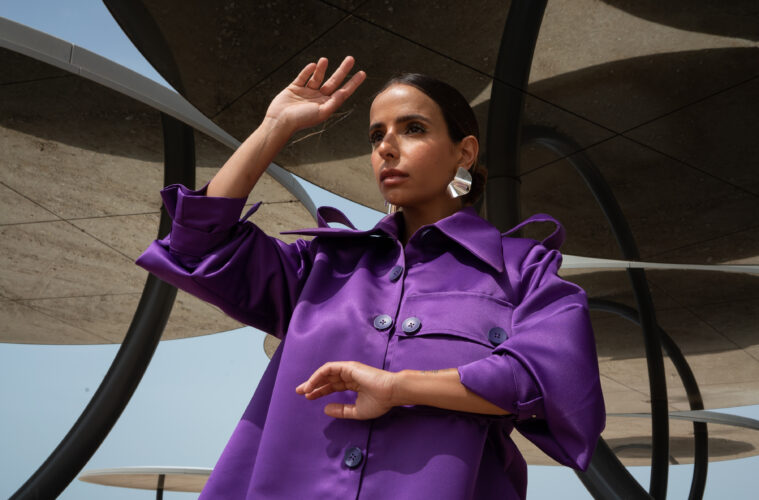Words by Khaled A.
Photography by Shaima Al-Tamimi
This article is part of the “The Wawa Complex” issue
Rotana paused for a moment and took a deep breath before answering any questions. She told me she recently moved to a farm outside of New York City, and she’s now focusing only on slowing down. It reminded me of the first time I met Rotana at a workshop she held — Calling all Habib(t)is — where she also asked everyone there to take a deep breath and be fully present, to the best of their ability.
Following her work and what she teaches, Rotana continues to cultivate her ability to be one with her body. It requires blocking out the noise and listening to what is within. This desire to claim and share the voice within is reflected in her latest album, Opening, a collection of prayers and chants sung in Arabic. Through this project, she invites listeners to reconnect with the divine beyond fear and punishment, and to close their eyes and listen. She hopes that each recording brings them closer to themselves and their land and people.
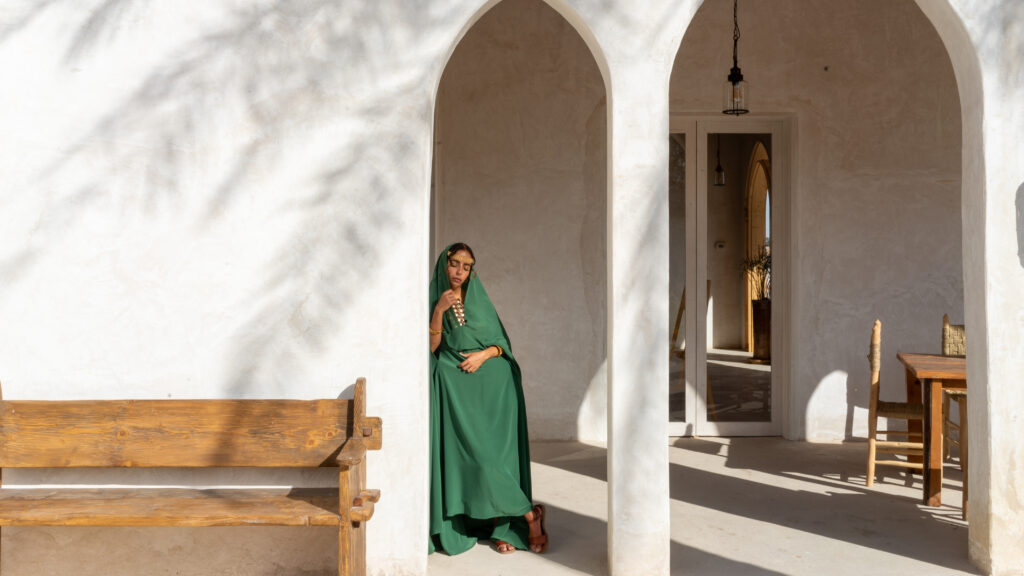
Photography by: Shaima Al-Tamimi
In this conversation, Rotana reflects on the connections that weave through her creative and educational projects and upbringing in Saudi Arabia, and how this helps her address the inner disconnect caused by shame and fear. She also talks about how Audre Lorde’s poetry changed her life, the tattoo on her wrist that reads ابقي (Stay), and the many homes she created along the way.
How would you introduce yourself to someone who just met you for the first time? What do you think is important to share about yourself and upbringing for them to understand you, personally and professionally?
I am from Saudi Arabia and Palestine – I was born and raised in Saudi, and my mother’s Palestinian. So much of the ritual that I have carried in my life, I learned there, especially this concept of devotion. I was privileged to feel safe and belonging, growing up – I was lucky enough to fit the norm – and I felt this beauty and connection to the divine, respect and celebration of ritual. The sense of innocence was also preserved; I grew up distanced from so many vices.
But I also felt separation from the divine. There was a lot of fear and shame, and a lot of brainwashing to make us believe that God was to be feared. We learned God is disconnected from our bodies and desires, which also disconnected us from the world. It was this obsession with ascension and getting to heaven that made it so we weren’t really here.
Now, I feel it’s important that I always use the word “initiator.” I really do start conversations, and I’ve realized it actually does nobody a service to shy away from that. The things I’m doing are a duty, and I’m letting the divine radiate through me. And I also describe myself as an erotic being and as a woman. I’m maybe one of the first people in my lineage in a very long time that has had the privilege and the safety to really be in the full spectrum of my womanhood.
It’s generous of you to look at Saudi with such gentleness, yet remain critical and honest about your upbringing there. What homes have influenced your trajectory, and how have they shaped you?
I have a song that’s coming out this year called “Us” about Arab womxn, particularly Saudi and Palestinian women. It’s about the energy of the feminine that is living in Saudi Arabia and Palestine, and the ways that women and feminine beings have this magic of making that which is impossible happen. We grew up hearing so many “no’s”, and yet we found a way to live, we found a way to find the yes. Saudi, through the constraints, taught me I don’t have to be confined to this place. I’m going to find a way to have a voice. I’m going to find a way to be loud and to scream because [girls] weren’t allowed to do that. I don’t consider myself an activist, but the energy of activism I carry has definitely been shaped by having Saudi as a home.
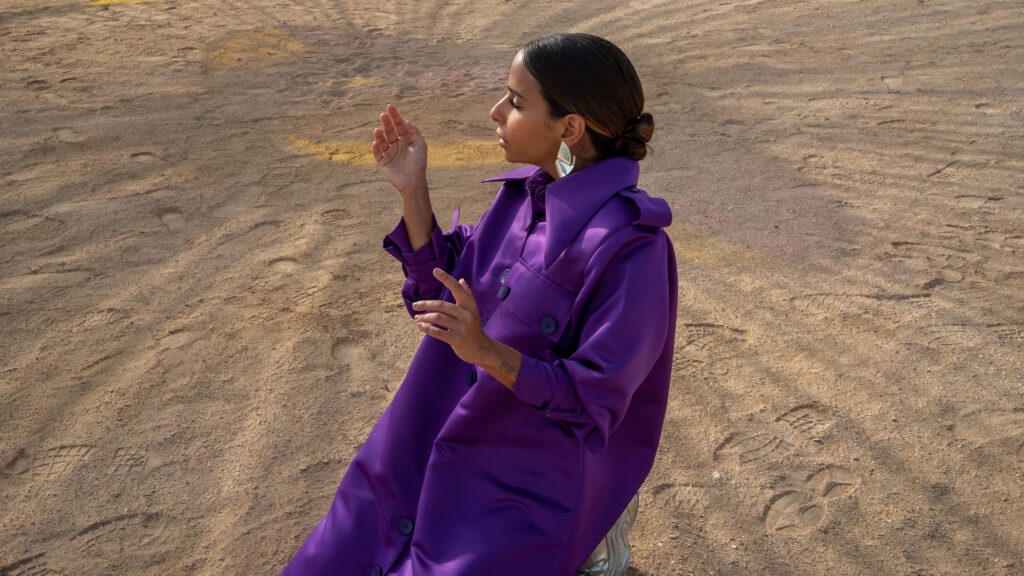
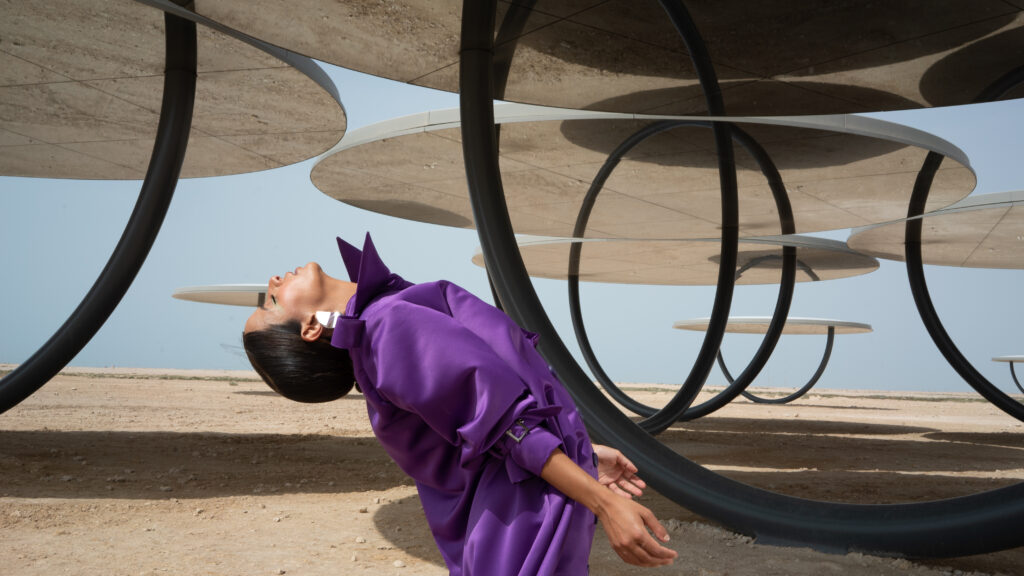
Photography by: Shaima Al-Tamimi
I lived in Saudi until I moved to Boston for college, and I returned after to work at Aramco (where I grew up) for three years1. My journey began when I moved to Los Angeles. I lived there for eight years, and it was a safe space for me to find my voice. I wouldn’t say that America gave it to me – I know America would like me to say that – but it gave me safety and space to explore what was already inside of me that was happening much earlier. I started exploring why I had a deep connection with my body, my body’s sexuality, and my body’s primal nature, from such a young age. I had so much shame and guilt and trauma around it, but I found communities that said like, “Don’t worry! You can be ashamed and afraid and confused, and we can talk about it — nobody’s going to hurt or judge you.”
I still wouldn’t call the U.S. home. Home is something that many of us in the diaspora think about a lot. There’s a quote by Naguib Mahfouz that accurately describes it: “Home is not where you are born; home is where all your attempts to escape cease.”2 To me, I feel at home when I’m no longer running from or escaping something. I found home in the community I built in LA – these were the people who, for the first time in my entire life, saw all of me and became my home.
You’ve mentioned that you’ve been juggling many projects that require different skills. As a performer, writer, and singer, how did you become acquainted with these roles? What sparked your interest in each one of them?
I’ve always known that I can write, but it was never nurtured growing up. I was happy when I went back to work at Aramco – I had an amazing job, and I loved my friends – but something was nagging me. I took three months off and went on a yoga retreat. It was awful, but the quiet was a gift. It was the first time I couldn’t hear anyone’s voice but my own. My voice was clear – I was meant to write and use my voice and move on. I didn’t know how to write music and wasn’t trained as a musician. I moved to the U.S. on instinct and with a pure intention. I met the incredible singer and writer, JP Saxe, who, with many other friends, taught me how to sing and write.
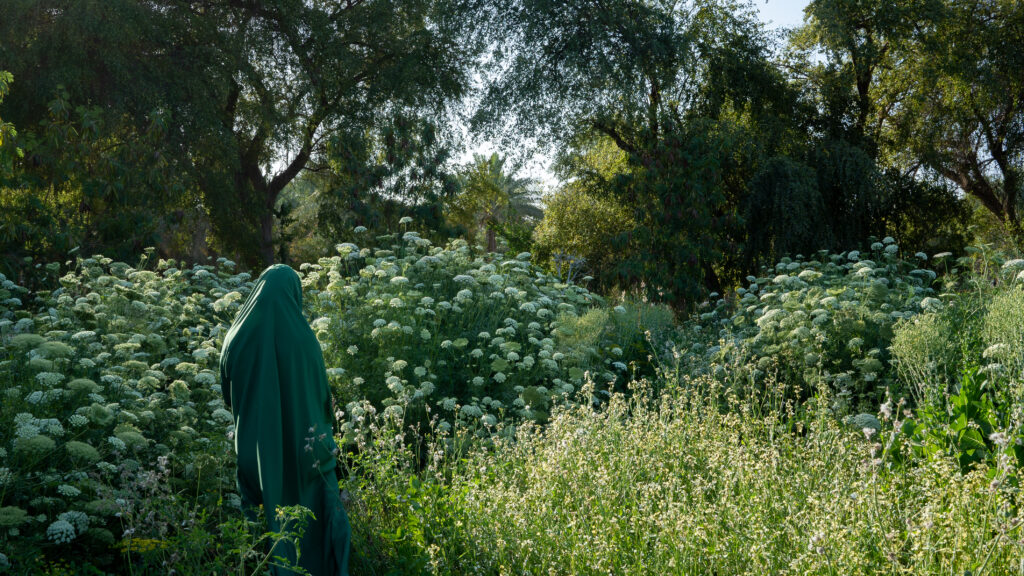
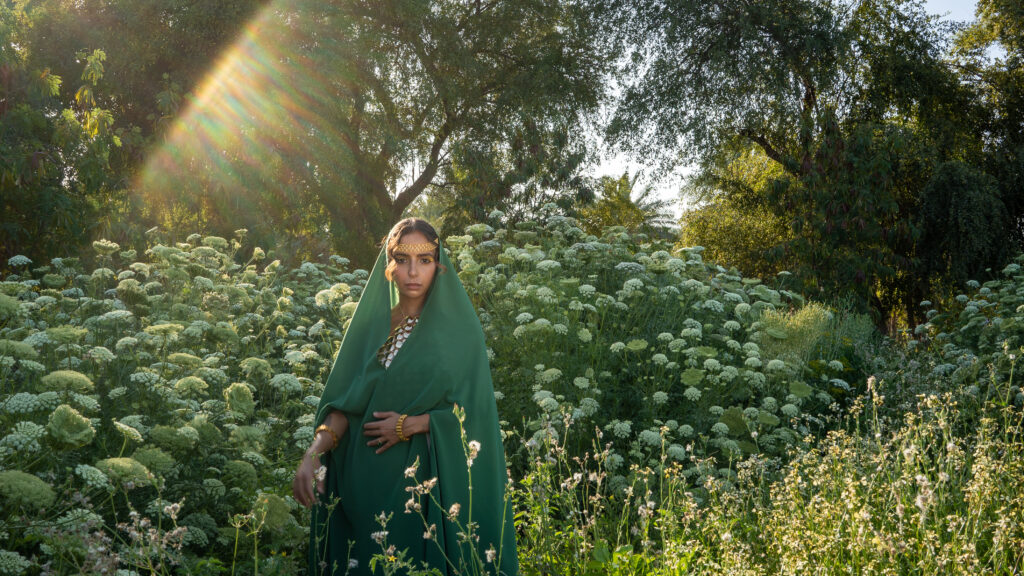
Photography by: Shaima Al-Tamimi
The part of me that teaches about the energy of the erotic, about the power or our relationship to our body, has been alive since I was young. I remember being in awe of my body at eight years old, wanting to crawl like an animal, feeling this energy of being connected to my body in my teens. There was something scary but also divine about this, but I was afraid of going to hell. I repressed it to something very private. Everything changed when I found the works of Audre Lorde3, including “Uses of the Erotic: The Erotic as Power.” It was the first time I had heard a woman speak about the erotic without the intent of seduction. She was talking about it in terms of our politics, our relationship with our families, and our relationships with our social justice systems. As soon as I read that essay, Pandora’s box was opened.
Fast-forward to last year, I taught four erotic aliveness cohorts of Arab women. I feel black queer women have been the source of my liberation – they’ve been my doulas to freedom.
Between the moment you discovered Lorde’s work until now, how have your practice and approach to your art evolved?
I’ve found “Uses of the Erotic” after three or four years in the U.S., and when I did, I realized I couldn’t write about love anymore. I want to write about death, my mother, the energy of creation, and God. I didn’t know if I was ready to share it, but I knew that it needed to come out of me. When I looked at this body of work, I realized I couldn’t just get on stage and sing the songs. Instead, I wrote a script – a new medium for me – which produced a hybrid of a theater show and a concert. I’m still working on it, and eventually it will be properly produced and premiered. I also have four songs that are coming out this year. I made a narrative to hold them together in a short film, with a friend of mine. This music woven into narrative has become a signature way of sharing my art.
As I got more knowledgeable about it, I realized it was really just a message that came through my meditations, and that I had to offer this to other Arab women and be in community with them.
You produced your projects, including Alien of Extraordinary Ability and F*D & BLESSED, through different platforms and media. What was your vision for each one of them, media-wise?
Alien of Extraordinary Ability is the concert-memoir-theater show I was talking about. It’s a semi-autobiographical piece that explores my journey of self-realization through the lens of the erotic against the backdrop of my home, Saudi Arabia, our relationships with our mothers, and our tribes.
F*D & BLESSED is an educational, straight to camera comedy series that specifically addresses women’s sexuality. It’s focused on eradicating shame. The premise is that if you keep a topic in the dark, it allows that subject to play out in harmful ways. When we hold something to the light, like when we hold our bodies and our sexual relationships with ourselves and others, we get to see all of it. We can actually practice harm reduction because we’re all informed. Let’s understand the nature of our bodies, what boundaries mean, what a yes feels like in our bodies, the myths about our bodies that have been used to control us. Let’s understand what erotic energy is. I believe that when you educate people in this way, and you remove the stigma and the shame, then the person is in a position of power. Even though it was entertaining, to me, it was less of an artwork and more of an educational piece.
Accessibility is also an important concern in your work – both linguistically and in terms of where it is posted. How did/do social media platforms like Instagram allow you to engage with your target audience?
I feel like a lot of the content that I share required me to move through such sacred spaces and blockages in my life. Since everyone has access to it, there are people that can’t even begin to fathom how sacred your journey is and just bash it. That is really painful. When I say painful, I mean that I don’t know if these people earned the right to engage with – what we’re sharing is something that you need to earn the right to experience.
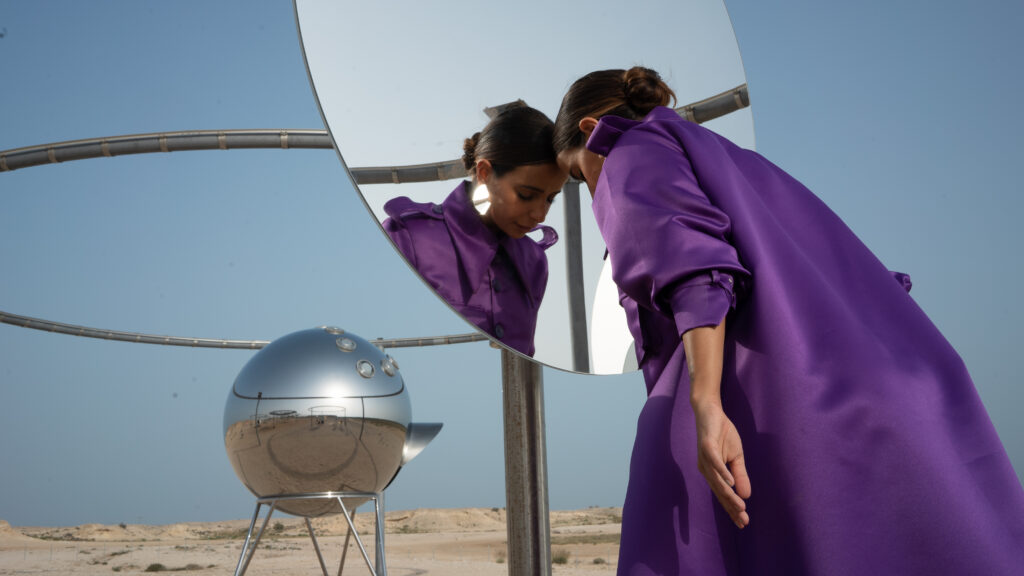
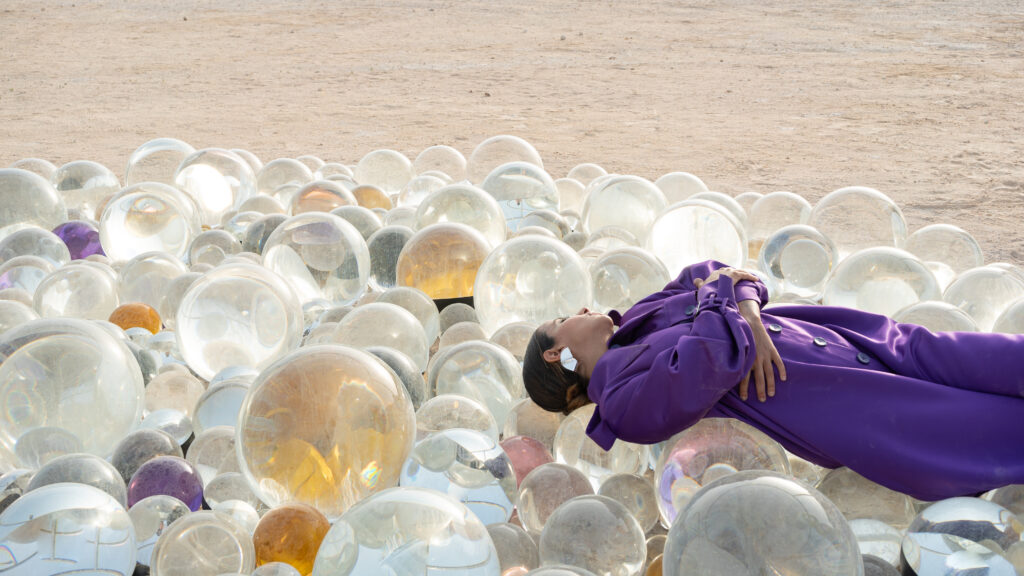
Photography by: Shaima Al-Tamimi
I have mixed feelings about Instagram. It’s been really powerful, and the most beautiful interactions happen in my DMs. That’s where queer people feel the most comfortable speaking with me. I would never say that I understand the queer experience fully, but I identify with queerness deeply and people can relate to that. We’ve been exiled. We’ve been on the outside of belonging. We’re also forsaking our belonging for truth. The conversations that have unfolded in my DM take my breath away. But I wish we could gather some type of in-person immersion. I’ll manifest this in some way, shape, or form.
Your relationship with the U.S. also seems complicated – you mentioned it gave you space to find your voice, but that it also places expectations on you as an Arab woman. How do you feel about producing such monumental works under an Oriental gaze that is waiting to generalize your experience?
It’s very frustrating. Our representation in the media is just a mess, unless it’s from Arab cinema, which is really exciting. It’s focusing on a singular person, their experience, and nuance, and it’s profound. But when we’re represented in [Western] media, we’re just this one big cluster.
It’s never been my intention to be anti-Orientalist in my work. It’s not something that I’m consciously trying to tackle or even speak to. My work is a lot more introspective; it’s about my particular being, and what needs to get freed inside of me. So much of our cultural fabric is steeped in the remnants of European and colonial movement, namely the disconnection from our bodies, Earth, the feminine. I’ve done deep work to break myself from these bonds and blocks, and I work with other women in my erotic aliveness containers.
I’ve been critiqued so many times about being Orientalist or fetishizing our culture, but this is my expression. Period. Of course, there has to be a harm analysis, but I need to create the art that is the most authentic and aligned with my vision.
Turning from the context in which you are creating to creation itself, can you say more about what you are working on?
I’m working on a visual EP called ابقي (stay) with Mayar Hamdan, an amazing Palestinian filmmaker and video game narrative designer who directed and produced it in collaboration with My Kali. This EP is about feminine desire and reframes it from something that is dangerous, selfish, and frivolous to something that is actually a spiritual calling. It’s autobiographical, a reminder that individuals are part of a whole. My hope is that the audience can really feel, through this narrative, that they’re watching this person understand that maybe desire is actually your soul’s deepest calling.
“Us,” is a tribute to Arab feminine energy, and the second song, “Here I Am,” is about coming into yourself, and the consequences and the death that come with that. “Stars or Something,” is a much more psychedelic song about discovering the divine through the earth and our bodies. And “Slow Motion Matador” is about understanding that some things have to come to an end and won’t be able to grow with you anymore.
I’m also working on a song called “Do It,” which will be released next year. The music video is shot and directed by Yumna Al-Arashi. Also, I’m still working on “Alien of Extraordinary Ability” – it’s a process of rewrites and finding a new director and just lots of exciting things.
I made a commitment that my goal this year is going to be present, and I was happy to make the sacrifices that came with that. I want to feel myself. I want to move slowly and see what wants to come through me.
- Aramco is the Saudi Arabian Oil Group, with headquarters in Dhahran, Saudi Arabia. The Aramco Residential Compound, where Rotana grew up, is a private compound with various services, where only Aramco employees and their dependents live.
- Naguib Mahfouz was a prolific Egyptian writer and novelist. He won the 1988 Nobel Prize in Literature, making him the first Arab writer to win the Nobel in this category. His work chronicles day-to-day life in Egypt and spanned various genres, and many of his novels have been adapted into films. Mahfouz was shot in 1992 by militants and suffered from his injury until his death.
- Audre Lorde was an American writer and poet, and a self-described “black, lesbian, mother, warrior, poet.” Her work transformed intersectional feminism and the use of poetry to address injustices in the United States against marginalized communities, especially black communities. Lorde died of liver cancer in 1992.

